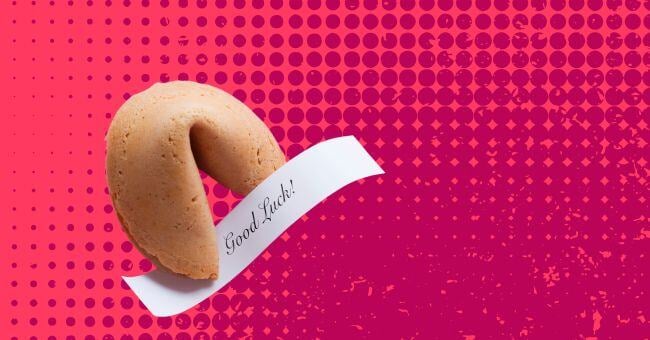Going for Goals
As we start the year it's natural to set goals for ourselves, our teams and our students. But this extract, from one of the podcasts by Prof. Jim...

- First published in the Sydney Morning Herald, July 2024
It has frequently been remarked that Donald Trump is the luckiest man alive, but [in the week when this article first appeared], the emphasis in the sentiment moved emphatically to the word “alive”. He literally almost dodged a bullet, save for a bit of ear.
Commentators are already speculating on how his lucky break might be sufficiently career enhancing to win back the presidency. Setting aside the dramatic nature of his luck this week, we should not be surprised when luck rears its head in career success.
One person who is likely unsurprised at Trump’s luck is Andrew Leigh, Assistant Minister for Competition, Charities and Treasury, and also Assistant Minister for Employment. He published his thoughts on the topic in his book, The Luck of Politics (2015, Black Inc).
Collecting together some wonderful tales of luck, both good and bad, but being a numbers man at heart, he has the stats. For instance, you are 354 times more likely to serve in parliament if one of your parents did. 
Your name could be the decider. A Middle Eastern name or a double-barrelled name knocks 2.3 percentage points off your vote.
If it is hot on polling day (10C above the average), the sitting government is seven per cent more likely to be re-elected.
Birth order matters to politicians. Apparently for male voters, if their firstborn is a son, they are nine per cent more likely to vote for the Coalition, than if their firstborn was a daughter. No, I have absolutely no idea why that might be either.
Successful careers are a matter of both luck and judgement. So, are you ready to get lucky?
Luck plays a role in all careers, not just those of politicians. Gerard Torpy completed his PhD research under my supervision on this very topic. In one study he surveyed and interviewed a group of highly successful graduates of a Group of 8 University College.
Their average annual incomes were double the national average, and 62 per cent of them said they’d experienced a chance event at work. Of that that group, 88 per cent said the event was lucky, and the same amount said they had experienced being in the right place at the right time.
The stories these senior people told about luck illuminate this important and often overlooked ingredient in career success. There was the lawyer whose long held ambition was to be a barrister until they filled an unexpected and urgent opening to become a judge.
Then there was “Wanda” who was pursuing musical ambitions until her family immigrated to Australia. Once here, she was able to study medicine, a pathway that her country of origin blocked for women. She became a doctor.
Sometimes the lucky break presents as a career epiphany, or a sudden insight that you really should be doing something else.
“Nola” had this experience while being interviewed for a legal position. She recalled: “And I sat in the interview and I had - it might sound a bit extreme, but literally had an epiphany. I was sitting there thinking, ‘I don’t want to do this! This is not for me at all!’” She ended up being a very successful administrator instead.

In a world of careers advice that emphasises having a plan, setting goals and generally treating career advancement that is something that can and should be controlled, it is worth reflecting on the role luck plays.
Importantly, it is worth working on ways to improve one’s luck. If being in the right place at the right time is such a common cause of good luck, maybe it is worth thinking about how you can increase your chances of being in the right place, and trying to guess when will be the right time.
Some strategies include getting out more, turning up to things, saying yes to invitations and assignments (as long as the assignment promises to place you in the action if the action is good, or well away from the action if the action is bad).
Sometimes bad luck brings good luck. As Andrew Leigh relates, in 1940, Robert Menzies lost three of his cabinet when the Hudson plane carrying them crashed into a hill in Canberra.
It allowed Harold Holt to be plucked from relative obscurity into the cabinet, and ultimately when Menzies retired, Holt became prime minister. Leigh speculates this would not have happened without the bad/good luck of the crash. Of course Holt’s career was going swimmingly until he had his own dose of bad luck.
Successful careers are a matter of both luck and judgement. So, are you ready to get lucky?
Dr Jim Bright, FAPS, is a director at IWCA and is Director of Evidence & Impact at BECOME Education.
Photo credits Sparklestroke and Anagramm from Getty Images (header), Austin Pacheco (siblings) and Christina Wocintechchat (meeting)
 Join Jim Bright and BECOME Education, to take your careers professional practice to the next level.
Join Jim Bright and BECOME Education, to take your careers professional practice to the next level.
This course covers professional practice in career development and career counselling, theory and practical contemporary approaches, and emerging trends.
Choose either the three-day in-person intensive (Sydney, 30 April-2 May 2025) OR the multi-modal hybrid online format combining live online seminars with Prof. Jim Bright plus self-paced learning on BECOME's flexible online learning platform.
Intake for both formats is open now.
Get more information, download the course overview, or sign up.
Read more on the BECOME blog:

As we start the year it's natural to set goals for ourselves, our teams and our students. But this extract, from one of the podcasts by Prof. Jim...

First published in the Sydney Morning Herald, June 10, 2023. Narrowing down our options is probably the most common approach to decision-making. Its...

First published in the Sydney Morning Herald, August, 2024. School careers advisors are like a “backwards Google” and the tools they use are...